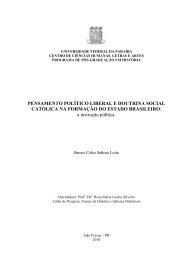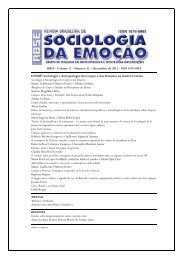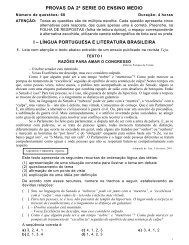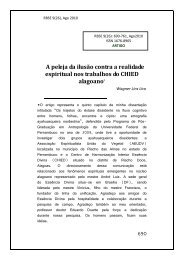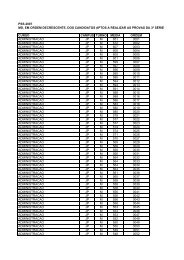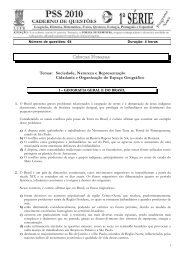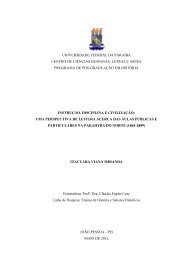abril de 2004 - CCHLA - Universidade Federal da ParaÃba
abril de 2004 - CCHLA - Universidade Federal da ParaÃba
abril de 2004 - CCHLA - Universidade Federal da ParaÃba
You also want an ePaper? Increase the reach of your titles
YUMPU automatically turns print PDFs into web optimized ePapers that Google loves.
Generated by Foxit PDF Creator © Foxit Softwarehttp://www.foxitsoftware.com For evaluation only.It implies both unity of the lovers, on the one hand,and separateness ("an extraordinary sense of individuali<strong>de</strong>ntity") on the other. This duality suggests that genuinelove involves a balance, over time, between unity andseparation.Although Solomon’s approach to <strong>de</strong>fining love veryhelpful, it is incomplete in that it lacks any reference tothe physical basis of non-erotic love, attachment, and forromantic love, both attachment and sexual attraction. Likethe other authors that emphasize the cognitive/emotionalsi<strong>de</strong> of love, Solomon simply ignores other si<strong>de</strong>s.If we are going to advance in our un<strong>de</strong>rstanding oflove, we will probably need to integrate the physical andthe cognitive/emotional into a single <strong>de</strong>finition. In anotherplace (Scheff, Chapter 6, forthcoming), I have <strong>de</strong>finednon-erotic love as a conjunction of attachment an<strong>da</strong>ttunement (shared i<strong>de</strong>ntity/awareness). For romanticlove, a third "A" is nee<strong>de</strong>d, (sexual) attraction.Like Jasper (2003), I consi<strong>de</strong>r love to be an affect.But I attempt to go further conceptually, by <strong>de</strong>fining thecomponents and their interplay. In this approach, most ofthe various combinations of these components, because ofthe attunement requirement, are not classified as genuinelove. Instead, they are viewed as look-alikes, such asmere <strong>de</strong>sire, infatuation, obsession, affection, unresolvedgrief, etc. This <strong>de</strong>finition of genuine love is more precise,complex, and narrower than both the vernacular meaningand the expert ones.At this point it might be well to respond to an innervoice that I frequently hear coming from my"commonsense," my response as an ordinary man, son,parent, lover, etc. "Wait a minute, I say, aren’t yourobbing love of its mystery, its sacredness, by <strong>de</strong>fining itin such an explicit way?"At first sight, my <strong>de</strong>construction of the concept oflove may appear to be Grinch-like. Why remove the auraof ineffability, of sacred mystery by <strong>de</strong>fining it as aconcept? Perhaps this attempt is only one more exampleof what Max Weber called the progressive disenchantmentof the world.118



